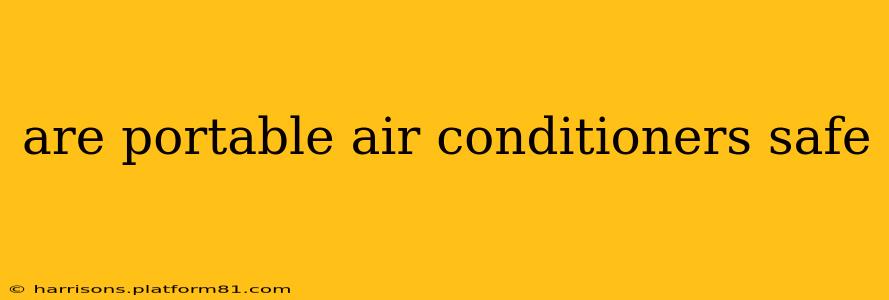Portable air conditioners offer a convenient cooling solution, especially for renters or those who need temporary climate control. However, safety concerns often arise regarding their operation and potential hazards. This comprehensive guide addresses common queries and provides a detailed analysis of portable AC safety.
What are the potential safety hazards of portable air conditioners?
Portable air conditioners, while generally safe when used correctly, present some potential hazards. These include:
-
Electrical Hazards: Improper installation or faulty wiring can lead to electrical shocks or fires. Always ensure the unit is properly grounded and the electrical cord isn't damaged. Avoid overloading circuits, and use a dedicated outlet if possible.
-
Water Damage: Portable ACs produce condensate (water) that needs to be properly drained or evaporated. Failure to manage this can result in water damage to your floor or surrounding furniture. Regularly check the water reservoir and empty it as needed.
-
Heat Hazards: The hot exhaust air expelled from the unit can pose a burn risk if touched, especially in children. Maintain a safe distance from the exhaust vent. The unit itself also generates heat during operation, so ensure it's placed on a stable, heat-resistant surface and away from flammable materials.
-
Carbon Monoxide Poisoning: While rare, improper ventilation can lead to a build-up of carbon monoxide if the unit is malfunctioning. Ensure adequate ventilation in the room to prevent this. Never operate a portable AC in an enclosed space without proper ventilation.
-
Falls: A poorly placed or unsecured portable AC could fall, causing injury or damage. Always place the unit on a stable, level surface.
Can portable air conditioners cause fires?
While relatively uncommon, fires can occur due to malfunctions, overloading circuits, or improper use. Using a portable AC with damaged wiring or neglecting maintenance significantly increases this risk. Always ensure the unit is correctly installed and regularly inspected for any signs of damage. Overloading electrical circuits is a major fire hazard, so avoid plugging other high-wattage appliances into the same circuit.
Are portable air conditioners energy efficient?
Portable air conditioners are generally less energy-efficient than window units or central air conditioning systems. Their efficiency depends on factors like the unit's SEER rating (Seasonal Energy Efficiency Ratio), the size of the room, and the insulation of the building. Choosing a properly sized unit for the room is crucial for optimal efficiency and to avoid overworking the unit.
How to ensure the safe use of a portable air conditioner?
Safe operation hinges on responsible use and regular maintenance. Follow these guidelines:
-
Proper Installation: Always follow the manufacturer's instructions for installation. Ensure the unit is placed on a level, stable surface and the exhaust hose is properly extended.
-
Regular Maintenance: Clean the filters regularly, as recommended by the manufacturer. This improves efficiency and reduces the risk of malfunctions.
-
Proper Ventilation: Ensure adequate ventilation in the room to prevent a build-up of moisture or carbon monoxide.
-
Circuit Overload Prevention: Avoid overloading electrical circuits by plugging the AC unit into a dedicated outlet.
-
Inspect for Damage: Regularly inspect the unit for any signs of damage to the electrical cord, hose, or casing.
-
Child Safety: Keep children away from the hot exhaust vent and the unit itself.
By adhering to these safety precautions and performing regular maintenance, you can significantly reduce the risks associated with using a portable air conditioner and enjoy cool comfort safely. Always consult the manufacturer's instructions for specific safety guidelines for your model.
